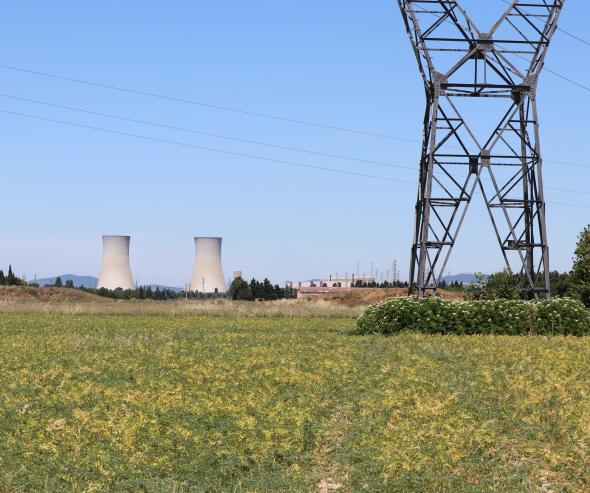Decommissioning operations at the Marcoule nuclear site (Gard): the Autorité fines six companies for anticompetitive agreements in calls for tender organised by the CEA

Background
Following a leniency application and dawn raids, the Autorité de la concurrence fined six companies in the engineering, maintenance, decommissioning and nuclear waste treatment services sector for engaging in anticompetitive agreements during calls for tender issued by the French Alternative Energies and Atomic Energy Commission (Commissariat à l'Energie Atomique et aux Energies Alternatives - CEA) for its Marcoule site in the Gard region.
The Autorité considers that, given their nature, their purpose and the context in which they took place, these practices were anticompetitive by their very nature. It has therefore imposed penalties totalling 31,239,000 euros on Nuvia Process (a subsidiary of the Vinci Group), ENDEL (a former ENGIE subsidiary), Bouygues Construction Expertises, SNEF and SPIE Nucléaire.
As the Autorité granted the ONET Group the benefit of the leniency procedure, this company has received a full exemption from financial penalties.
Decommissioning nuclear power plants
At the end of their operating life, nuclear facilities are decommissioned. The main objective of this activity is to remove all hazardous and radioactive substances present in these facilities. In particular, it may involve dismantling equipment, the remediation of the structures and soils, the destruction of civil engineering structures as well as radioactive and non-radioactive waste treatment, packaging, elimination and disposal1.
These operations can span over decades, and represent challenges for operators in terms of managing projects, maintaining skills and coordinating the various works, which often involve several specialist companies working on the same site.
The contribution of the leniency procedure to the revelation of the case
In this case, the practices were revealed primarily thanks to the leniency procedure, which allows undertakings that have participated in a cartel to disclose its existence to the Autorité and, under certain conditions, obtain the benefit of a total or partial exemption from financial penalty. In this instance, the ONET Group applied for leniency for its subsidiary ONET Technologies ND (OTND) and provided information for the investigation.
The documents provided by the leniency applicant were then supplemented by the dawn raids carried out by the Autorité's Investigation Services (handwritten notes, emails, telephone records, summary documents, etc.). Several hearings completed the analysis of these different documents.
In view of ONET's contribution to the proceedings, the Autorité granted it full exemption from the financial penalties.
The companies consulted each other before responding to calls to tender and shared out the contracts.
The Autorité accused OTND, Nuvia Process (NUVIA), ENDEL, BCEN, SNEF and SPIE Nucléaire, all active in the remediation and decommissioning of nuclear sites, of exchanging commercially sensitive information with a view to responding to certain calls to tender organised by the CEA for different installations in Marcoule, in order to agree on the price levels to be offered and share out the contracts.
-
Agreements relating to the framework agreement
In January 2015, the CEA launched a call for tender with the aim of concluding a framework agreement with several companies for an initial period of three years. The aim of this framework agreement was to organise and simplify the use of services to meet a number of small-scale requirements.
It was found that, prior to the submission of tenders for the awarding of the framework agreement, three of the companies awarded this framework agreement (OTND, ENDEL and NUVIA) had taken part in meetings, and exchanged information, notably concerning the price lists to be submitted in response to the call for tender organised by the CEA.
Subsequently, during the implementation of the framework agreement, BCEN, which was also awarded the framework agreement, took part in the anticompetitive practices implemented by the three aforementioned companies. Each of the four winning companies talked to its competitors before bidding for the various subsequent contracts covered by the framework agreement. In particular, the Autorité found that the companies had broken down the different contracts between them, with a precise monitoring of allocations. To this end, the company wanting to win the contract provided competitors with its price breakdown table, enabling them to draw up cover bids.
The Autorité noted that the participants in the anticompetitive agreement exchanged information on a very regular basis, using different communication channels such as email, text message and physical meetings to review the status of the writing specifications allocated. Some participants even used personal email addresses or those of other family members.
-
Practices outside the framework agreement
The Autorité noted that exchanges between decommissioning service providers also took place for nine other ad hoc calls for tender, which did not fall within the scope of the framework agreement. Depending on the calls for tender, these exchanges involved several of the service providers present on site, which, in addition to those awarded the framework agreement, included other service providers such as SNEF and SPIE Nucléaire. Here too, the parties colluded and artificially allocated the different contracts to each other by means of cover bids.
Particularly serious practices
For the Autorité, these practices are among the most serious breaches of competition rules, as they aim to remove the advantages that consumers and the public entity are entitled to expect from a competitive economy, and instead benefit the perpetrators. Disrupting the normal course of tendering procedures by hindering the free market pricing process and misleading the public authority as to the reality and extent of competition between tenderers, is detrimental to the sector in which such practices take place, and constitutes a serious breach of economic public policy.
The Autorité also noted that the identified practices were structured in their modus operandi, and kept secret.
Sanctions imposed
In line with its decision-making practice, the Autorité decided to sanction the companies responsible for the practices, jointly and severally with their parent companies, due to the latter companies' capital links with the subsidiaries involved.
To determine the amount of the penalties, the Autorité took into account the seriousness and duration of the practices in question.
The Autorité also took into account the specific situation of each company. A mark-up was applied for NUVIA, ENDEL and BCEN as they are part of a conglomerate.
The Autorité also took account of the repeated nature of the offences committed by the VINCI and Bouygues groups.
Lastly, the ONET Group benefited from the leniency procedure, which enabled it to obtain a full exemption from sanctions for the reported practices.
The Autorité therefore imposed a total penalty of 31,239,000 euros. It also ordered the sanctioned companies to publish a summary of this decision in the printed versions and on the websites of designated press publications.
The amount of the penalty imposed on each of the implicated groups is shown in the table below, it being specified that objections 2 to 10 were subject to a single penalty:
| Objection 1 concerning the framework agreement (euros) | Objections 2 to 10 concerning practices outside the framework agreement (euros) | TOTAL amount (euros) | |
|---|---|---|---|
| OTND jointly and severally with ONET SA and Holding Reiner | 0 | 0 | 0 |
| NUVIA jointly and severally with Soletanche Freyssinet and Vinci | 12 752 000 | 1 159 000 | 13 911 000 |
| ENDEL jointly and severally with ENGIE | 10 800 000 | 256 000 | 11 056 000 |
| BCEN jointly and severally with Bouygues Travaux Publics and Bouygues | 6 242 000 | n.a. | 6 242 000 |
| SNEF | n.a. | 20 000 | 20 000 |
| SPIE Nucléaire jointly and severally with SPIE Opérations and SPIE SA | n.a. | 10 000 | 10 000 |
1 To learn more, access the French Nuclear Safety Authority (Autorité de sûreté nucléaire, ASN) website : https://www.asn.fr/Informer/Dossiers-pedagogiques/Le-demantelement-des-installations-nucleaires
Decision 23-D-08 of 07 September 2023
Contact(s)
